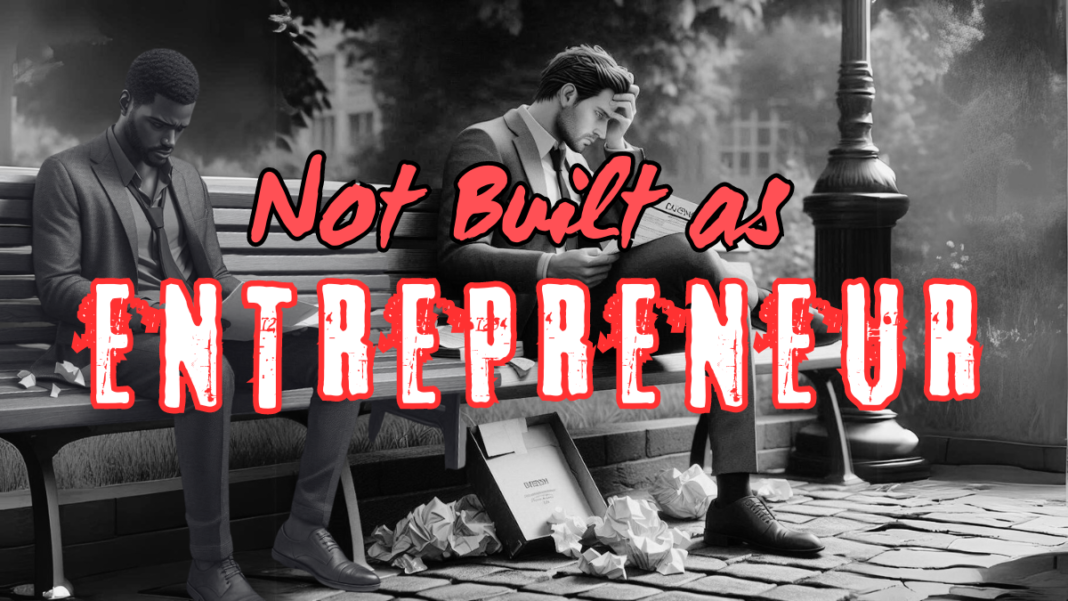Entrepreneurship is often glorified as the ultimate career path, offering freedom, creativity, and the potential for substantial financial rewards. However, it’s not a journey suited for everyone. The reality is that successful entrepreneurs possess a unique blend of traits and habits that enable them to thrive amidst uncertainty, solve problems proactively, and maintain a long-term vision. If you find yourself fitting into any of the following descriptions, it might be worth reconsidering whether entrepreneurship is the right path for you.
1) Those Who Don’t Invest in Themselves Consistently
Being an entrepreneur is like being an athlete—you need to constantly train and improve. If you’re not regularly investing in your health, self-education, or expanding your knowledge base, how do you expect to grow your business? Successful entrepreneurs are relentless learners. They attend workshops, read voraciously, and seek out mentorship. They understand that personal growth directly impacts their business growth. So, if you’re content with your current level of knowledge and skills, you might find entrepreneurship overwhelming and stagnating. It’s not just about working hard but working smart and continuously leveling up.
2) Those Whose Goals Don’t Spark Laughter or Amazement
Let’s face it: the world’s most successful entrepreneurs often have visions that sound ludicrous to the average person. If your dreams are so safe that no one raises an eyebrow or laughs in disbelief, you might be thinking too small. Entrepreneurship thrives on big, audacious goals that push boundaries and challenge the status quo. If your ambitions are modest, you may lack the driving force that propels entrepreneurs through tough times. The most groundbreaking innovations often come from dreams that seemed impossible or laughable at first. So, if your goals don’t make people chuckle or scratch their heads in wonder, you might want to aim higher.
3) Those Who Avoid Fixing Problems
If you’re the kind of person who walks past a leaky tap without fixing it or ignores a pile of trash instead of taking it out, entrepreneurship might not be for you. Businesses are essentially built on solving problems. Entrepreneurs must have a hands-on, fix-it mentality, always looking for ways to improve and solve issues efficiently. If you’re not inclined to tackle problems head-on, even the small ones, managing the multitude of challenges in a business will be daunting. Successful entrepreneurs are proactive problem solvers who don’t wait for others to fix things for them.
4) Those Who Hesitate to Help Others
Entrepreneurship isn’t just about personal success; it’s about building and nurturing relationships. If you find yourself second-guessing whether to help someone in need, this hesitation could be detrimental to your business. Successful entrepreneurs are often generous with their time and resources, understanding that helping others can lead to mutual benefits. This generosity builds trust and fosters strong networks, essential for any business’s growth and sustainability. If you’re not willing to go out of your way to assist others, you might struggle to build the necessary relationships that can help your business thrive.
5) Who Hasn’t Created or Started Anything
Entrepreneurs are fundamentally creators and innovators. If you’ve never embarked on creating or building something—regardless of its scale, success, or failure—you might lack the essential entrepreneurial spirit. This could be as simple as starting a blog, launching a side project, or even organizing a community event. These experiences teach valuable lessons in initiative, resourcefulness, and resilience. If you haven’t taken the initiative to start something from scratch, the world of entrepreneurship, which thrives on creation and innovation, may not align with your skills and mindset.
6) Who Hasn’t Done a Variety of Roles
Entrepreneurship demands versatility. If you’ve been too focused on a single skill set or role throughout your career, you might find it challenging to wear the many hats required in entrepreneurship. Successful entrepreneurs are capable of handling a variety of roles: they can get involved in product design, finance, marketing, innovation, team management, and negotiation, among other things. This broad experience is crucial because it equips them with the flexibility and comprehensive understanding needed to manage and grow a business. If you haven’t diversified your roles or skills, you might struggle to meet the multifaceted demands of entrepreneurship.
7) Those Who Nag About Small Things but Overlook Big Issues
Do you sweat the small stuff and let bigger issues slide? This tendency can be a major hindrance in entrepreneurship. While attention to detail is crucial, an entrepreneur must prioritize effectively. Obsessing over minor details while ignoring major problems can lead to significant setbacks. Entrepreneurs need to keep an eye on the big picture and ensure critical issues are addressed while maintaining a balanced focus on smaller, yet important, details. If you’re bogged down by trivial matters, you’ll miss out on addressing the bigger challenges that could make or break your business.
8) Those Who Think Only About Money
If your primary motivation for starting a business is to make money, then maybe you will make some money, but you’re setting yourself up for failure. While profit is important, it shouldn’t be the sole focus. Successful entrepreneurs are driven by a deeper purpose, whether it’s solving a problem, fulfilling a passion, or making a positive impact in the world. Focusing only on profit can lead to short-term thinking and poor decision-making or worst loosing people. Purpose-driven businesses tend to be more resilient and attract loyal customers and employees. If you can’t see beyond the dollar signs, you might miss out on creating a meaningful and sustainable business.
9) Those Who Can’t Maintain Long-Term Relationships
Relationships are the backbone of any business. If you have difficulty maintaining long-term relationships, this could spell trouble for your entrepreneurial endeavors. Whether with customers, employees, partners, or investors, building and sustaining relationships is key. This requires consistent effort, good communication, and mutual respect. There could the relations where you don’t talk to them for years, but still you both know you got each other’s back needed, even such relationships foster well. Flaky or superficial relationships can undermine trust and reliability, essential components for business success. If you’re not capable of fostering lasting relationships, you might struggle to build the network and support system that a thriving business needs.
10) Those Who Avoid Taking Strategic Risks
Entrepreneurs must be willing to take calculated risks which is backed by their knowledge and gut feeling. If you’re risk-averse or only willing to spend on non-essential items, your priorities might be misaligned. Strategic risks often lead to significant growth and opportunities, whereas avoiding risk can result in missed chances and stagnation. Being an entrepreneur means stepping out of your comfort zone and making bold moves that can propel your business forward. If you’re not ready to embrace the uncertainty that comes with risk-taking, entrepreneurship might be a challenging path for you.
11) Those Who Complain Instead of Adapting
The business world is constantly changing, and adaptability is crucial. If you’re prone to complaining about circumstances rather than adapting to them, entrepreneurship may not be for you. Successful entrepreneurs are resilient and resourceful, finding ways to turn challenges into opportunities. Complaining does nothing but waste time and energy that could be better spent on problem-solving and innovation. If you can’t roll with the punches and adapt to changing conditions, you’ll find it hard to keep up in the fast-paced world of business.
12) Those Who Make Decisions Based on Personal Comfort
Entrepreneurs often have to make tough decisions that aren’t comfortable. If you tend to prioritize your own comfort over what’s best for your team or business, you’ll struggle with leadership. Your business/venture is your baby, and you’re a parent. Good entrepreneurs put the needs of the business and their team above their own comfort. This might mean making sacrifices, working long hours, or stepping into unfamiliar roles to ensure the success of the business. If you’re not willing to get uncomfortable for the sake of your business, entrepreneurship might not be the right path for you.
13) Those Without Active Hobbies or Interests Outside Work
A well-rounded life is crucial for maintaining creativity and avoiding burnout. If you don’t have hobbies or interests outside of your work, you might find yourself lacking balance and inspiration. Engaging in activities unrelated to your business can provide fresh perspectives and new ideas, while also helping you manage stress. Entrepreneurs who lead well-rounded lives are often more innovative and better equipped to handle the pressures of running a business. If your life revolves solely around work, you may struggle to find the creativity and resilience needed to sustain a successful business.
In conclusion, entrepreneurship is not for everyone. It requires a unique blend of qualities, a relentless drive for self-improvement, and a willingness to embrace risk and uncertainty. If you see yourself in any of these descriptions, it might be worth reconsidering your entrepreneurial aspirations or working on these areas before diving into the challenging yet rewarding world of entrepreneurship.


